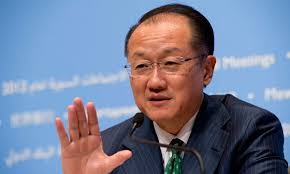The World Bank has predicted that Nigeria will record about 2.5 percent economic growth this year, as prospects of improved commodity prices, investments and trade brightens for the country.
This is even as the bank forecasts that global economic growth would rise to 3.1 per cent in the year.
The Breton Woods institution also predicted in its January 2018 Global Economic Prospect Report launched yesterday in Washington DC, that the country’s Gross Domestic Product (GDP) next year and year 2020 would grow by 2.8 per cent.
According to the multilateral financial institution, Sub-Saharan Africa’s growth will rise to 3.2 per cent and 3.5 per cent in 2018 and 2019 respectively as demand for commodity goods and their prices continue to increase.
It reported: “South Africa is forecast to tick up to 1.1 per cent growth in 2018 from 0.8 per cent in 2017. The recovery is expected to solidify, as improving business sentiment supports a modest rise in investment. However, policy uncertainty was likely to remain and could slow needed structural reforms.
“Nigeria is anticipated to accelerate to a 2.5 per cent rate this year from one per cent growth in the year just ended. An upward revision to Nigeria’s forecast is based on expectation that oil production will continue to recover and that reforms will lift non-oil sector growth”.
The bank stated that growth in Angola is expected to increase to 1.6 per cent in 2018, as a successful political transition improves the possibility of reforms that ameliorate the business environment while Côte d’Ivoire’s economy is forecast to expand by 7.2 per cent in 2018 compared to Senegal’s 6.9 per cent; Ethiopia’s 8.2 per cent, Tanzania’s 6.8 per cent, and Kenya’s 5.5 per cent as inflation eases in the various economies.
However, the report indicated that growth would remain below pre-crisis averages, as larger economies continue in their struggle to improve private investment.
The World Bank reported further that the regional outlook for Sub-Saharan Africa was subject to external and domestic risks as any unexpected activity in the United States and Euro Zone as well as abrupt slowdown in China could have a negative impact on the region.
It clarified further: “On the domestic front, excessive external borrowing without forward-looking budget management could worsen debt dynamics and hurt growth in many countries. A steeper-than-anticipated tightening of global financing conditions could also lead to a reversal in capital flows to the region. Protracted political and policy uncertainty could further hurt confidence and deter investment in some countries.
“Rising government debt levels highlight the importance of fiscal adjustment to contain fiscal deficits and maintain financial stability. Structural policies including education, health, labour market, governance, and business climate reforms could help bolster potential growth,’’ the World Bank added.
To ensure a more robust global economic system, the bank urged policy makers worldwide to focus on human capital investments as a strategic option of improving national economic productivity, reducing the level of extreme poverty and promoting shared prosperity among world population.
.






